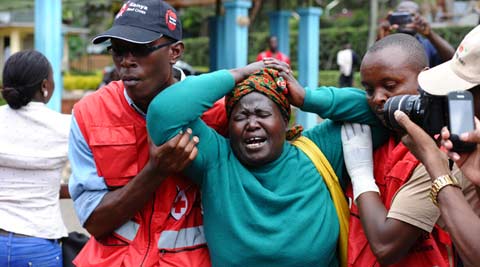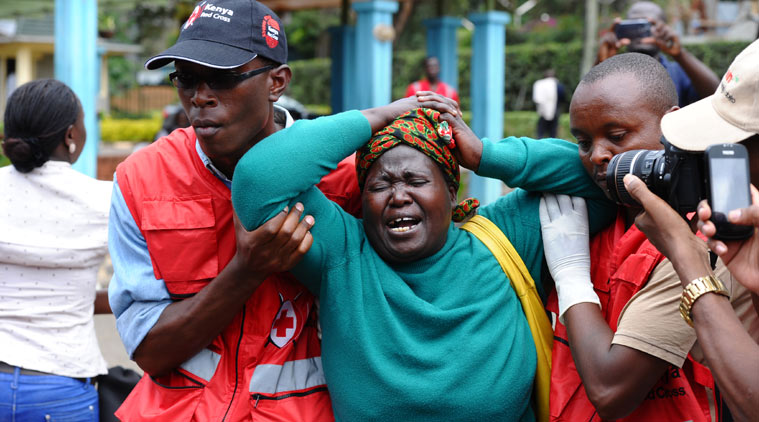Opinion My outrage and yours
Even those who rush to indict terrorism at every turn seem to treat this incident with nonchalant indifference.

 Is it, as is quite plausible, racism, plain and simple, where African lives simply matter less? Or is it also a reminder that evil is never enough to provoke outrage, and outrage is seldom about sympathy with the victims?
Is it, as is quite plausible, racism, plain and simple, where African lives simply matter less? Or is it also a reminder that evil is never enough to provoke outrage, and outrage is seldom about sympathy with the victims?
It is a paradox of our times that we seem to have both too much outrage and too little. Internationally, the horrific killing of university students in Garissa by terrorists has once again ignited the debate over selective outrage. The world stood in solidarity with France after Charlie Hebdo. But Kenya seems almost abandoned after an attack that, in scale and ideological framing, seems very significant. Even those who rush to indict terrorism at every turn seem to treat this incident with nonchalant indifference. Why? Is it, as is quite plausible, racism, plain and simple, where African lives simply matter less? Or is it also a reminder that evil is never enough to provoke outrage, and outrage is seldom about sympathy with the victims?
Outrage is often more about us rather than the victims. That is why evil has to be framed appropriately if it is to get more attention. France got more solidarity for a number of reasons. First, there is a kind of odd moral intuition behind the greater attention we give to the sufferings of the powerful, be it nations or individuals. It is not so much moral blindness but the thought that “if even they are not immune, what hope do lesser mortals have”. If even power could not secure you, what are the chances for the powerless? The greater the power the greater the sense of tragedy. And it is tragedy that draws more attention than suffering.
Second, our sympathies are rarely with victims understood solely as human beings. We construct solidarity with them by placing them in a cultural narrative. Whether it is due to universalism or imperialism or both, there is a sense in which the culture of the West has become intimately ours, often even in our denial of this fact. It is not so much French lives that we care about (we seldom care about life itself); it is that the values implicated in that attack — enlightenment, speech or whatever — impinge on us, our identity and our debates, more directly. Often, even the significance of life needs a story behind it. Our singular failure is that African stories do not play this part in our imagination. But this is true domestically as well — those victims matter to us where there is a prior political framing that engages us.
Expressing outrage can be an important tool if used with judgement. But the currency of outrage is currently inevitably debased. Outrage has become an industry. There are political and material gains to provoking the emotional response of outrage. But this constant production of outrage will blur the distinction between the morally significant and the morally trivial. But the outrage is also managed.
The sense of outrage should be enough to move the audience, make it feel righteous, but not enough to destabilise the system. We want the anger, not the anarchy. One element in this strategy is to produce short attention spans. It is quite striking how quickly the rush of outrage dissipated after the December 16, 2012, rape case. This is despite the fact that the unfathomable sickness of sexual violence now enveloping Indian society is all too palpable. To be sure, India is not unique or even the most egregious case of this. The question of gender violence is turning out to be genuinely hard and difficult to fathom.
And routinised evil is harder to outrage about than one-off events. But it is striking how the outrage over the December 16 case was such a short-lived teachable moment. Rather, the industry is now more outraged by feigned concern over India’s reputation. For all the production of outrage, its function is not to take us out of our moral comfort zones, it is to reinforce them. And outrage is seldom out of concern for the victims in their human individuality. It has to be framed for political purposes.
Outrage is seldom a product of sympathy. Rather, it has to do more with maintaining our identities. Outrage often comes out of collective narcissism more than identification with victims. The most elemental expression of this is the fact that outrage rarely crosses group or political boundaries. Outrage that moves us usually affects our group. In our democratic contexts, the way of maintaining group identities is to find an outrage around which to rally. Even genuine tragedies are denuded of their universal significance and appropriated in an identity war.
Arguably, we now outrage more about selectivity in outrage than we are moved by the tragedies unfolding before us. The inevitable response to outrage in every tragedy is: but where were you when that other tragedy happened and so on. This is, to a certain extent, inevitable. But it also means that the energy unleashed by outrage will be deflected from the original problem itself. It becomes a site to express other resentments.
The relationship between expressions of outrage and justice has often been tenuous. Outrage often trades on a will to simplicity that stands in the way of justice. But the presence of outrage is attended by another problem. In a world crowded with information and voices, there is pressure to create messages that attract attention. Ironically, outrage also has to be branded and marketed. It needs a hashtag to rally around. But the more outrage of this kind, the less the likelihood of mutual understanding.
A sense of alienation in a democracy is often expressed in the simple refrain, “everyone is expressing outrage, but who is listening?” Often this refrain is directed against those in power. Citizens often feel their outrage is not heard. But a deeper and perhaps subtler form of alienation is produced when the experience is the same between citizens — they are talking a lot, but are they actually listening to one another? The more voice we have, the less we seem to be able to get others to respond to what we are saying. The more we express our outrage and our feelings, the more illiterate we seem about the arguments and feelings of others. Perhaps the elemental democratic experience is not that “I spoke”. It is being acknowledged by someone with the simple phrase “I hear you”. That is a phrase we don’t hear often enough.
So we are in a paradoxical culture where we can complain that there is both too much outrage and that there is too little. Perhaps these are two sides of the same coin. For outrage, sometimes a legitimate tool of moral resistance, is now used for the opposite effect: to obfuscate and render invisible the very things that should make our blood boil.


